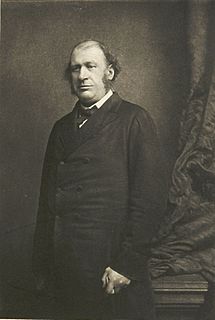A Quote by Rutherford B. Hayes
Personally I do not resort to force - not even the force of law - to advance moral reforms. I prefer education, argument, persuasion, and above all the influence of example - of fashion.
Related Quotes
For Christians above all men are forbidden to correct the stumblings of sinners by force...it is necessary to make a man better not by force but by persuasion. We neither have authority granted us by law to restrain sinners, nor, if it were, should we know how to use it, since God gives the crown to those who are kept from evil, not by force, but by choice.
If you think your belief is based upon reason, you will support it by argument rather than by persecution, and will abandon it if the argument goes against you. But if your belief is based upon faith, you will realize that argument is useless, and will therefore resort to force either in the form of persecution or by stunting or distorting the minds of the young in what is called 'education.'
Obey; this may be right; but beware of reverence.... Government is nothing but regulated force; force is its appropriate claim upon your attention. It is the business of individuals to persuade; the tendency of concentrated strength, is only to give consistency and permanence to an influence more compendious than persuasion.
The libertarian approach is a very symmetrical one: the non-aggression principle does not rule out force, but only the initiation of force. In other words, you are permitted to use force only in response to some else's use of force. If they do not use force you may not use force yourself. There is a symmetry here: force for force, but no force if no force was used.
There can be, therefore, no true education without moral culture, and no true moral culture without Christianity. The very power of the teacher in the school-room is either moral or it is a degrading force. But he can show the child no other moral basis for it than the Bible. Hence my argument is as perfect as clear. The teacher must be Christian. But the American Commonwealth has promised to have no religious character. Then it cannot be teacher.
The combination of moral intentionality and human innovation is a powerful force. And that's the force behind the humane economy. By embracing its tenets, we help animals, but we also advance commerce in a more sustainable, and profitable, way. I think we have every reason to believe it is the way of the future.
Christ is a persuasion, a form evoking desire, and the whole force of the gospel depends upon the assumption that this persuasion is also peace: that the desire awakened by the shape of Christ and his church is one truly reborn as agape, rather than merely the way in which a lesser force succumbs to a greater, as an episode in the endless epic of power. (3)
If an instrument similar to a geiger-counter could be invented that counted moral judgements instead, we would learn to duck as people became increasingly 'moral', since lethal force is usually imminent. So far from moral fervour being an alternative to force, it is frequently the overture, the accompaniment and the memorial to it.


































